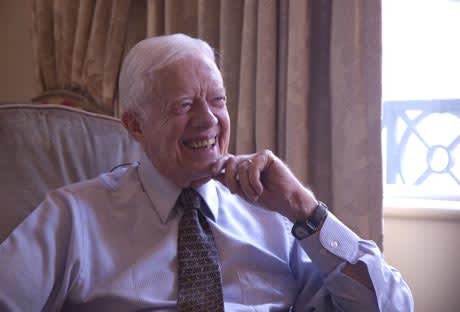Jimmy Carter Man From Plains is not a conventional Presidential biography despite having Jimmy Carter as its subject. The documentary has a much narrower focus, following Carters 2006 book tour in support of his controversially titled tome Palestine: Peace, Not Apartheid. The ex-president comes across as smart, thoughtful and entirely dedicated to his role as an elder statesman with an obligation to bring global injustices to light.
Much of the film takes place in radio and television stations across the U.S., where Mr. Carter is subjected to endless interrogations on his title choice and the perceived bias behind it, often by interviewers that have clearly not read the book past the title page. The film sticks mostly to the roots of Carters interest and work in the Middle East, with an extended segment about his role in brokering the peace treaty between Israel and Egypt (for which he won a Nobel Peace Prize). It delves into his personal life only to mention the profound influence of his mother, a Peace Corps nurse, and the strength of his marriage to Rosalynn.
Director Jonathan Demme, best known for helming Hollywood fictions such as Silence of the Lambs, Philadelphia, is no stranger to the documentary genre, having made numerous music-inspired films (Stop Making Sense, Neil Young: Heart of Gold), as well as the recent political documentary The Agronomist. His style is artful and intimate, shooting Carter in extreme close-ups with such unfettered access that it suggests a close and easy relationship between filmmaker and subject.
A side focus of the film gives us a behind the scenes look at the media covering the book tour. Much of the film is shot in the make-up rooms and control booths before and during Carters televised appearances, observing some of the politics seeping into these supposedly objective on-air spaces. Its telling to see which questions get asked over and over, which questions never get asked and what footage ends up never airing.
(Sony Classics)Much of the film takes place in radio and television stations across the U.S., where Mr. Carter is subjected to endless interrogations on his title choice and the perceived bias behind it, often by interviewers that have clearly not read the book past the title page. The film sticks mostly to the roots of Carters interest and work in the Middle East, with an extended segment about his role in brokering the peace treaty between Israel and Egypt (for which he won a Nobel Peace Prize). It delves into his personal life only to mention the profound influence of his mother, a Peace Corps nurse, and the strength of his marriage to Rosalynn.
Director Jonathan Demme, best known for helming Hollywood fictions such as Silence of the Lambs, Philadelphia, is no stranger to the documentary genre, having made numerous music-inspired films (Stop Making Sense, Neil Young: Heart of Gold), as well as the recent political documentary The Agronomist. His style is artful and intimate, shooting Carter in extreme close-ups with such unfettered access that it suggests a close and easy relationship between filmmaker and subject.
A side focus of the film gives us a behind the scenes look at the media covering the book tour. Much of the film is shot in the make-up rooms and control booths before and during Carters televised appearances, observing some of the politics seeping into these supposedly objective on-air spaces. Its telling to see which questions get asked over and over, which questions never get asked and what footage ends up never airing.
